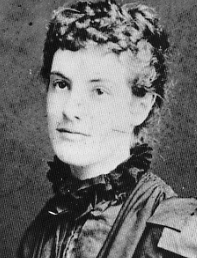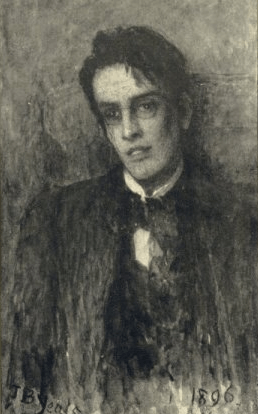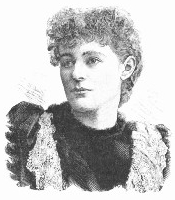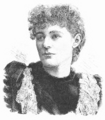Olivia Shakespear facts for kids
Quick facts for kids
Olivia Shakespear
|
|
|---|---|
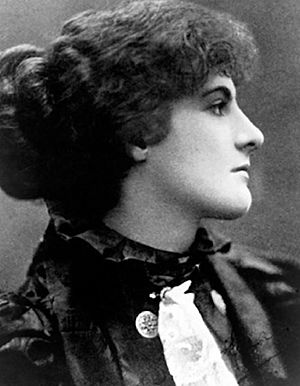
Shakespear in 1897
|
|
| Born | Olivia Tucker 17 March 1863 Isle of Wight, England |
| Died | 3 October 1938 (aged 75) London, England |
| Children | Dorothy Shakespear |
| Relatives |
|
Olivia Shakespear (born Tucker; 17 March 1863 – 3 October 1938) was a British writer and supporter of the arts. She wrote six novels and two plays. Her last novel, Uncle Hilary, is considered her most important work.
Olivia was the daughter of a retired army officer. She did not go to a formal school but loved to read and learn on her own. In 1885, she married Henry Hope Shakespear, a lawyer in London. In 1886, their only child, Dorothy, was born.
In 1894, Olivia became friends with the famous poet William Butler Yeats. They had a very close friendship that lasted their whole lives. Olivia started hosting weekly gatherings in 1909. Many important writers and artists, like Ezra Pound, came to these meetings.
Olivia's daughter, Dorothy, married Ezra Pound in 1914. Olivia helped support writers like T. S. Eliot and James Joyce through her son-in-law, Ezra Pound. When Dorothy had a son, Omar Pound, in 1926, Olivia became his guardian. Omar lived with Olivia until she passed away in 1938.
Contents
Early Life and Marriage
Olivia's father, Henry Tod Tucker, was born in Edinburgh. He joined the British Indian Army when he was 16. He became a high-ranking officer but retired early due to poor health. In 1857, he married Harriet Johnson.
The couple moved to the Isle of Wight, where Olivia was born on 17 March 1863. They later moved to Sussex and then to London. Olivia often visited her many relatives in the countryside. She was especially close to her cousin Lionel Johnson, who became a poet and a friend of W. B. Yeats.
Olivia likely learned at home from tutors. She became very well-read and loved books.
In 1885, Olivia married Henry Hope Shakespear. Henry was born in India and came from a military family. He studied law and started his own law practice. Olivia and Henry married on 8 December 1885. Olivia's father gave them enough money to live comfortably.
Their daughter, Dorothy, was born on 14 September 1886. Olivia soon realized her marriage was not very exciting. She was a kind and imaginative person. She seemed to accept her marriage until she met Yeats.
Henry Shakespear started his own law practice in the late 1880s. During this time, Olivia began spending time with other literary women. These included Valentine Fox and Pearl Craigie, a writer who used the name John Oliver Hobbes.
Friendship with W. B. Yeats
On 16 April 1894, Olivia met the poet W. B. Yeats at a dinner. Yeats had just returned from Paris. He was in London for his play The Land of Heart's Desire. Yeats was very impressed by Olivia's beauty and style.
Soon after, Olivia saw Yeats's play and was deeply moved. She wanted to meet him. She asked her cousin Lionel Johnson to invite Yeats to tea. Yeats later wrote about Olivia in his memoirs, calling her "Diana Vernon."
They quickly became good friends. Olivia listened to Yeats talk about his feelings for another woman, Maud Gonne. Yeats said Olivia was a sympathetic listener. They often discussed literature and his poems.
Their friendship was very important to both of them. Olivia found in Yeats someone who could talk about books and ideas. Yeats felt relaxed and comfortable with her. He compared Olivia to Diana, a goddess, and Maud Gonne to Helen. He described Olivia's skin as "a little darker than a Greek's" and her hair as "very dark."
A writer named Humphrey Carpenter said Olivia had "a profound culture." She knew French, English, and Italian. She seemed to always have time for her friends. She was gentle and thoughtful.
Olivia was also working on her third novel, Beauty's Hour. Yeats likely read her manuscript and gave her ideas for it. They were also interested in the occult, which is the study of hidden knowledge.
In August, Yeats went back to Ireland. He continued to write letters to Olivia. In her letters, Olivia might have shared her true feelings for him. In April 1895, Yeats wrote to her, saying he didn't mind her writing about love.
Close Relationship and Its End
Yeats visited Olivia at her home. Olivia told him she loved him. Yeats was unsure what to do. He decided that if he couldn't be with the woman he truly loved (Maud Gonne), he would focus on Olivia. Olivia was willing to risk a lot for him, including her social standing.
On 15 July 1895, Yeats and Olivia traveled to Kent. Yeats wrote that Olivia gave him a "long passionate kiss" on their train journey. They shared more kisses in art galleries and at her home.
Yeats was still thinking about Maud Gonne. He moved into a flat near his friend Arthur Symons. One day, he was so busy thinking about Maud that he locked himself out just before Olivia arrived. After Olivia left, he stayed up all night talking to Symons about Maud.
Yeats was still unsure about Olivia. He didn't have much money to support her. He suggested she get a legal separation from her husband instead of a divorce. This would help her avoid social problems and financial ruin.
In January 1896, Yeats moved closer to Olivia. He wrote that they "had many days of happiness." Yeats's happiness showed in the poems he wrote during this time. Olivia seemed to inspire him.
Six months later, Yeats returned to Ireland. In August, Olivia was visiting a friend when she learned her father had died. She stayed in Torquay for a long time, then visited Scotland with her husband. Yeats went to Paris to see Maud Gonne in November.
Yeats returned to London in January 1897. Maud Gonne arrived in London in February. Yeats wrote that Maud's visit caused him trouble. One morning, Olivia realized Yeats's feelings had changed. She cried and said, "There is someone else in your heart." This was the end of their close relationship for many years. Olivia did not visit him at his flat for a long time after that.
Life in Pembroke Mansions
Not much is known about Olivia's life between 1897 and 1908. In 1902, her cousin Lionel Johnson died. In 1899, her family faced money problems. They had to move to a smaller apartment in Bayswater called Pembroke Mansions. A friend described it as an "uninviting" area. A few months later, Olivia's mother died. Yeats sent Olivia a letter of sympathy. This might have been the first letter she received from him in two years.
For a short time in 1901, Olivia reviewed books for a small magazine called The Kensington Review. The magazine closed due to low sales. After that, she became interested in the occult, which involves hidden or mystical knowledge. She became friends with important occultists in London. In 1902, she wrote two plays about the occult with Florence Farr. These plays were called The Beloved of Hathor and The Shrine of the Golden Hawk.
Even though the family received money from Olivia's mother, they stayed in Bayswater. Their daughter Dorothy went to boarding school and then a finishing school in Geneva. To save money, the family often left London in the summer. They would visit relatives in the countryside. In 1905, they leased a house in Brunswick Gardens, near Kensington Palace. Dorothy returned home to live with her parents there.
Dorothy and Ezra Pound
More is known about Olivia's life after 1909, thanks to her daughter Dorothy's letters and diaries. This was when the American poet Ezra Pound arrived in London. Olivia started hosting weekly gatherings, called salons, at her home. This became a very important time in her life.
When Yeats returned to London that year, Olivia's home became a center for a new literary movement. Many writers and artists came to her gatherings. These included Pound, Hilda Doolittle, Yeats, Wyndham Lewis, Henri Gaudier-Brzeska, and James Joyce. Pound described Olivia's drawing room as "full of white magic." Olivia was also known for her interest in the occult. She hosted séances (meetings to contact spirits) and knew a lot about astrology and palmistry. She shared this knowledge with Dorothy, who was also interested.
Olivia met Pound in January 1909. She invited him for tea. At his request, she introduced Pound to Yeats in May 1909. Yeats was exploring spiritualism and the occult, and Olivia gave him advice. She took the young American poet to Yeats's rooms, helping their friendship grow.
Dorothy soon fell in love with Pound. In late 1909 and early 1910, Olivia and Dorothy attended Pound's lectures. In June 1910, they joined him in Sirmione, Italy. Dorothy considered herself engaged to Pound.
In 1910, Yeats thought his horoscope suggested he should spend more time with Olivia. He started seeing her more often. Pound was fond of Olivia. A year later, Olivia introduced Yeats to Georgie Hyde-Lees. Georgie was Olivia's step-niece and Dorothy's best friend. Yeats eventually married Georgie.
Pound returned from America in 1911. He continued to visit Olivia and Dorothy. In October, Pound formally asked to marry Dorothy. Her father refused because Pound did not earn much money. Dorothy and Pound did not give up. He asked again in March 1912 but was rejected again. They were only allowed short visits in the family drawing room.
In 1913, Olivia introduced Pound to the sculptor Henri Gaudier-Brzeska. In 1914, Olivia translated an old book about magic for Yeats and Pound. They were researching the occult in the countryside. Her translation was published in a literary magazine called The Egoist.
By 1914, Olivia realized Dorothy was determined to marry Pound. She finally agreed to the marriage. Pound was earning even less money than before. Dorothy's father agreed when the couple chose a church wedding. They were married on 20 April 1914. Olivia gave them two early drawings by Pablo Picasso as a wedding gift.
Later Life and Passing
After Dorothy's wedding, there is less information about Olivia's life. In 1924, she moved out of Brunswick Gardens. She threw away personal letters and gave away many books. Hope Shakespear, her husband, died on 5 July 1923. Within months, Olivia moved to an apartment in West Kensington. She continued to have a busy social life.
In September 1926, Dorothy gave birth to a son, Omar Pound. In 1927, Omar was brought from France to be raised in England. Olivia became his guardian. Dorothy spent summers with her mother and son.
| Your hair is white My hair is white Come let us talk of love What other theme do we know When we were young We were in love with one another And therefore ignorant |
| —A draft of "After Long Silence" that Yeats sent to Olivia in 1929. |
In 1926, Yeats spent several weeks in London. He likely visited Olivia often. He expressed regret about his past actions. He wrote to her, "I came across two early photographs of you yesterday... Who ever had a like profile?—a profile from a Sicilian coin." They continued to write letters to each other for many years.
Olivia remained social and had many friends. The artist Wyndham Lewis painted her portrait. She stopped writing but loved to read. She enjoyed detective stories and kept up with literary authors. She became friends with Thomas MacGreevy. She told him that Yeats was about 29 when she first knew him. MacGreevy told Yeats that Olivia was "always a symbol of elegance."
Olivia continued to write to Ezra Pound throughout the 1920s and 1930s. She sometimes helped him with his work in London. She welcomed George Antheil into her social circle at Pound's request. She also helped resolve a disagreement between Pound and Lewis. Olivia was not interested in Pound's political or economic ideas. She especially disliked his later poems, The Cantos.
After her husband's death, Olivia had enough money to live comfortably. She gradually gave more money to Dorothy. She also made investments in Dorothy's name. Much of the money Ezra Pound used to support struggling writers like T. S. Eliot and James Joyce came from Olivia. Because of this, she is seen as an "unsung heroine" of the modernist period.
Olivia passed away on 3 October 1938, due to complications from a gall bladder illness. Yeats was deeply affected by her death. He died only a few months later.
Dorothy was ill when her mother died and could not travel to London. She sent Pound to arrange the funeral and clear out the house. Ezra sorted through Olivia's letters and returned many of them to Yeats. Yeats later destroyed a large group of letters he had received from Olivia. He wanted no one else to read them.
List of Works
Novels
- Love on a Mortal Lease (1894) – WorldCat
- The Journey of High Honour (1894) – WorldCat
- The False Laurel (1896) – WorldCat
- Rupert Armstrong (1898) – WorldCat
- The Devotees (1904) – WorldCat
- Uncle Hilary (1909) – WorldCat
Plays
- The Beloved of Hathor (1902) – ISBN: 9781177395977 (reprint, also includes The Shrine of the Golden Hawk)
- The Shrine of the Golden Hawk (1902)
Novella
- "Beauty's Hour" (1896) – ISBN: 9781943910403 (reprint)
Images for kids


